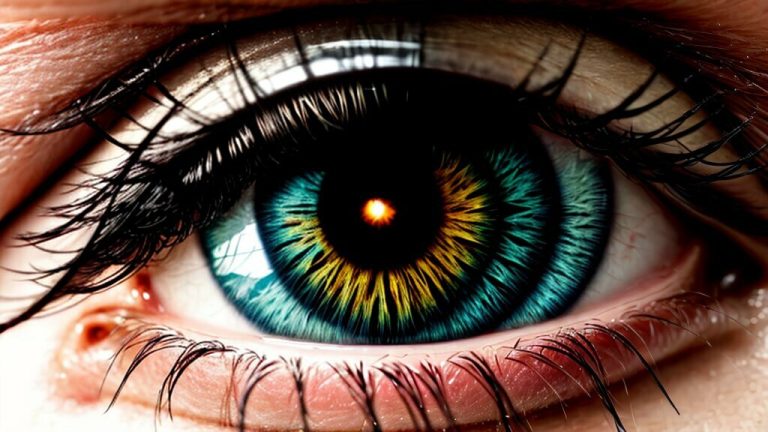Have you ever looked in the mirror and noticed that your eye color seems to be getting lighter? While eye color can change naturally over time, it can concern some individuals. In this article, we will explore the possible causes behind this phenomenon and provide potential solutions for those worried about their changing eye color and knowing what is in lighter fluid.
Key Takeaways:
- Eye color can change naturally over time
- Genetics, aging, medical conditions, and environmental factors can all affect eye color change.
- Hormonal changes during puberty can affect eye color
- Natural methods such as lifestyle changes and home remedies may have the potential to lighten eye color
- Contact lenses and makeup can be used as temporary solutions for those concerned about their changing eye color
What Causes Changes in Eye Color?
The amount and type of pigment determines the color of our eyes in the iris, which is the colored part of the eye. While some people maintain the same eye color throughout their lifetime, others may experience changes in their eye color. But what causes these changes?
Genetics of Eye Color Change
One of the primary factors that determine eye color is genetics. The genes we inherit from our parents can influence the amount and type of pigment in our iris, thus affecting our eye color. However, it is important to note that eye color is not always a straightforward inheritance pattern and can also be influenced by other factors.
Factors Affecting Eye Color
Aside from genetics, other factors can contribute to changes in eye color. Aging is one such factor, as the pigment in the iris can fade over time, gradually lightening eye color. Medical conditions such as Waardenburg syndrome, Horner syndrome, and certain eye infections can also affect the pigmentation of the iris, resulting in a change in eye color. In addition, hormonal shifts during puberty can cause a temporary change in eye color, as can exposure to certain environmental factors such as sunlight.
It is also worth noting that changes in eye color may be due to an optical illusion rather than an actual change in pigmentation. For example, using colored contact lenses, makeup techniques, and lighting conditions can all create the illusion of eye color change.
While changes in eye color can be a concern for some individuals, they are typically harmless and do not require medical treatment. However, if you notice a sudden or significant change in your eye color, or if it is accompanied by other symptoms such as eye pain or vision problems, it is important to seek medical attention.
Eye Color Change During Puberty
Puberty is a period of significant physical and hormonal changes in the body, which can also affect the color of the eyes. During puberty, hormonal shifts can impact the amount of pigment in the iris, leading to a change in eye color.
The color change during puberty is usually subtle and occurs gradually over time. It is more common for individuals with lighter eye colors, such as blue or green, to experience a noticeable change in eye color during puberty compared to those with darker eye colors.
The reason for this change lies in the genes responsible for eye color. Genes determine the amount of pigment, the type, and the distribution of pigment in the iris. During puberty, changes in hormonal levels can affect how these genes are expressed, leading to a change in the amount and type of pigment produced in the iris.
Although eye color changes during puberty are considered natural, it is essential to rule out any underlying medical conditions contributing to the change. Any sudden or significant change in eye color should be discussed with a healthcare provider to determine the cause.
Eye Color Change with Age
Our bodies undergo various changes as we age, including the gradual lightening of our eye color. This process is a natural part of aging and can occur in adults and elderly individuals.
The pigmentation of our iris, the colored part of our eye, is determined by the amount of melanin in it. As we grow older, the cells responsible for producing melanin begin to decrease in number, resulting in a lighter color of the iris. This process is gradual, and the extent of color change can vary from person to person.
Another factor contributing to eye color change with age is the development of cataracts. A cataract is a clouding of the eye’s natural lens that typically occurs in older individuals. As the lens becomes cloudier, it can cause a person’s eye color to appear lighter or even cloudy.
Eye color change due to aging is a natural process that does not require medical intervention. However, if an individual experiences sudden or drastic changes in their eye color, they should seek medical attention to rule out any underlying medical conditions.
Medical Conditions Causing Lightening of Eye Color
While it’s normal for eye color to change over time, certain medical conditions can lead to a noticeable lightening of the iris. Here are some conditions that can cause this change:
| Condition | Description |
|---|---|
| Waardenburg syndrome | A rare genetic condition that affects the pigmentation of the eyes, hair, and skin. People with this syndrome may have eyes of different colors or eyes that are two different colors. |
| Horner syndrome | A condition that affects the nerve pathways that control the pupil size and the eyelid’s position. Horner syndrome can cause one eye to appear lighter than the other. |
| Fuchs heterochromatic iridocyclitis | A type of uveitis is inflammation of the eye’s middle layer that can cause one eye to appear lighter than the other. It can also cause a slight change in the color of both eyes. |
| Vogt-Koyanagi-Harada syndrome | It is a rare autoimmune disorder that affects multiple organs, including the eyes. This syndrome can cause eye inflammation and a change in eye color. |
If you’re experiencing a sudden or noticeable change in eye color, it’s important to see an eye doctor to rule out any underlying medical conditions.
How to treat medical conditions causing lightening of eye color
The treatment of these conditions varies depending on the specific condition and its severity. Medications or surgery may sometimes be necessary to manage symptoms and prevent further eye damage. Your healthcare provider can help you develop the right treatment plan for you.
Eye Color Change After Laser Eye Surgery
Undergoing laser eye surgery is a common procedure for those seeking to correct their vision. However, some individuals have reported a change in their eye color after the surgery. This change is believed to be due to the removal of the cornea’s outer layer during the procedure, which can sometimes result in an alteration of the amount of light that passes through the iris.
While rare, this side effect can occur in some individuals. It is important to note that the eye color change is usually insignificant and may only be noticeable to the individuals themselves or those close to them.
If you are considering laser eye surgery and are concerned about a potential change in eye color, it is important to discuss this with your doctor. They can provide you with more information about the risks and benefits of the procedure and help you make an informed decision.
How to Lighten Eye Color Naturally
While there is no guaranteed way to change the color of your eyes naturally, some people believe that certain home remedies and lifestyle changes may potentially affect eye pigmentation. Here are some possible methods:
- Honey: Some people claim that applying honey to the eyes can lighten the color over time. However, this method has not been scientifically proven.
- Eye drops: Certain eye drops containing prostaglandin analogs used to treat glaucoma are known to have a potential side effect of changing eye color. However, these drops should only be used under the supervision of a doctor.
- Sunlight: Exposure to sunlight may cause the eyes to produce more melanin, which could result in a slight darkening of eye color.
Keep in mind that these methods may not be effective and could potentially be harmful. It is always best to consult a doctor before trying new remedies or treatments.
Other Factors Influencing Eye Color Change
Aside from genetics, age, puberty, medical conditions, and laser eye surgery, other factors can influence the perceived change in eye color.
One external factor is lighting conditions. Ambient lighting can alter how our eyes appear, making them seem lighter or darker than usual. Additionally, different types of artificial light, such as fluorescent and incandescent bulbs, can impact perceived eye color.
Makeup can also play a role in changing the appearance of eye color. Applying certain shades of eye makeup, such as blue or green eyeshadows, can create an illusion of lighter eye color. Similarly, colored contact lenses can be used to change the appearance of eye color.
Emotional factors can affect the way we perceive eye color as well. Studies have shown that emotions such as excitement, fear, and sadness can cause the pupils to dilate or constrict, which may impact perceived eye color.
It is important to note that while these factors can create an illusion of eye color change, they do not alter the pigmentation of the iris itself.
Solutions for Those Concerned About Eye Color Change
If you are concerned about your changing eye color, there are several options available to address your concerns:
- Colored contact lenses: If you are unhappy with your current eye color, consider wearing colored contact lenses to achieve your desired look. These lenses come in various colors and can be worn daily or just for special occasions.
- Makeup techniques: You can use makeup to enhance or alter your eye color. For example, wearing eyeshadows in a complementary color can make your eyes appear brighter and more vibrant.
- Counseling: For those struggling with emotional distress related to their eye color change, counseling may be helpful. Speaking with a mental health professional can support and guide managing these feelings.
However, it’s important to note that these solutions are not permanent and do not alter the underlying cause of your eye color change. If you are experiencing a sudden or significant change in eye color, it’s important to see a doctor to rule out any underlying medical conditions that may require treatment.
Conclusion
In conclusion, several possible causes for eyes getting lighter in color include genetics, aging, medical conditions, and environmental factors. While some of these causes are natural and cannot be prevented, options are available for those concerned about their changing eye color. Natural remedies such as certain foods, teas, and eye exercises may help to lighten eye color, although scientific evidence is limited. Additionally, colored contact lenses and makeup techniques can be used to alter the appearance of eye color. It’s important to remember that emotional factors can also play a role in perceived eye color, and seeking counseling may be beneficial for those struggling with distress related to their eye color change. Individuals can make informed decisions about their eye health and appearance by understanding the possible causes and options for addressing eye color change.

I’m Alfred Davis, and I’m all about lighters. Hailing from the great state of Texas, USA, I’ve cultivated a deep passion for these fascinating gadgets. With years of hands-on experience and a burning curiosity (pun intended), I’ve become an expert in all things related to lighters.
My journey with lighters began as a hobby and quickly became a full-blown obsession. I’ve explored the diverse world of lighters inside and out, from classic Zippo designs to modern plasma arc models. I’ve tested, tinkered with, and even collected rare pieces while learning the intricate mechanics and unique histories behind each one.
Through my writing, I aim to share my knowledge, insights, and reviews to help you make informed decisions about choosing the perfect lighter. Whether you’re a seasoned collector or just looking for a reliable fire source, I’ve got you covered. Join me in unraveling the fascinating realm of lighters right here at LightersInfo, where ignition meets expertise.
Alfred Davis

